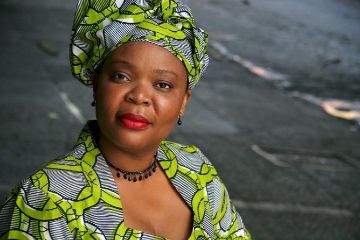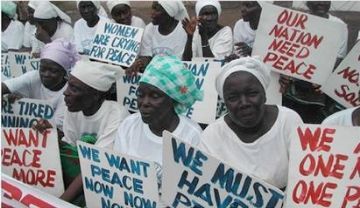Leymah Gboweh
Leymah's happy youth in Liberia ended with the civil war in 1990: she witnessed murder, rape, escape and was herself the victim of a violent man. She became the mother of several children, trained as a social worker, and continued her education in trauma healing and reconciliation. Through the women's association of her church, she came into contact with other women, and eventually the Women's Network for Peace WIPNET was born.
Together with other women, Leymah carried out many actions for peace, one of which is the 2003 sit-in in front of Liberian President Taylor's palace with prayer and song. Over 2000 women in white persevered in the heat and rain.
She receives important impulses for her peace work at Eastern Mennonite University, a university in the USA founded by descendants of Swiss Anabaptists. In 2011, Leymah Gbowee was awarded the Nobel Peace Prize. The film Pray the Devil back to Hell and the book Mighty be our powers portray the misery of war and the non-violent commitment of Leymah and many other women.
More information:
Leymah Gbowee (born 1972) is a civil rights activist and politician from Liberia. She was honored with the Nobel Peace Prize in 2011 for her tireless nonviolent efforts on behalf of women's safety and rights and for her peace efforts in the midst of Liberia's civil war.

Leymah Gbowee speaks at Eastern Mennonite University in 2011 (Photos EMU/ Leymah Gbowee).
Leymah's happy youth in Liberia ended with the civil war in 1990: she witnessed murder, rape, escape and was herself the victim of a violent man. She became the mother of several children, trained as a social worker, and continued her education in trauma healing and reconciliation. Through the women's association of her church, she came into contact with other women, and eventually the Women's Network for Peace WIPNET was born.
The Sit-In
Together with other women, Leymah carried out many actions for peace, one of which is the 2003 sit-in in front of Liberian President Taylor's palace with prayer and song. Over 2000 women in white persevered in the heat and rain. This event is impressively described in her book Mighty be our powers:

Women sitting for peace.
(photos EMU/ Leymah Gbowee).
In the past, we were silent. But after being killed, raped, dehumanized and infected with diseases, and watching our children and families destroyed, war has taught us that the future lies in saying NO to violence and YES to peace! We will not relent until peace prevails! [1]
The sun rose. And then I heard the sound of diesel engines and up the road toward me came a line of buses. Mixed in were trucks – trucks full of women. There were a hundred on the field...three hundred... five hundred...a thousand.
I started to cry and to pray. The women kept coming.
More than two thousand women were on the field now. Market women. Displaced women from the camps. Some of them had been walking for hours and wore clothing so old it barely looked white. One woman had used a curtain for a hair tie because she didn’t have anything else.
Taylor slowed but didn’t stop. I knew that he’d seen us – all of us. We sat again. By noon it was ninety degrees; by four it was over a hundred. We ran out of water and I had to fetch more from home. We sang. People passing by stared. At the end of the afternoon, Taylor’s convoy went by again. We were still out there with our signs. We had started something too big to stop. We would see this through to the end.
Dawn to dusk, twelve hours. We passed the time different ways. Sometimes women would dance. Sometimes they would preach. The slogan of our action was a simple one: “We want peace, no more war.”
The podium was placed so that I spoke facing away from Taylor. So I turned to Grace Minor, president of the senate. She was the only female governmental official in the room, and I wanted to speak to her as a woman.
We, the women of Liberia, we are tired of war. We are tired of running. We are tired of begging for bulgur wheat. We are tired of our children being raped. Wa are now taking this stand, to secure the future of our children. Because we believe, as custodians of society, tomorrow our children will ask us: Mama, what was your role during the crisis?”
The president listened, expressionless. He replied smoothly that he was sick that day but had decided to meet with us anyway. “No group of people could make me get out of bed but the women of Liberia, who I consider to be my mothers.” [2]
Gbowee, a Lutheran, received significant impulses for her peace work through her studies at Eastern Mennonite University, a university founded by descendants of Swiss Anabaptists in Harrisonburg, Virginia (USA).
In 2007, she earned a master's degree from the Center for Justice and Peacebuilding (CJP) there. This now world-renowned training center has more than 3,000 graduates from more than 100 countries. Its founders, John Paul Lederach and Howard Zehr, are internationally known experts in the field of conflict transformation and justice. Significantly, Lederach and Zehr are descendants of Anabaptist families who had to flee Bernbiet because of their faith and its pacifist emphasis.
Regarding her time at EMU Mennonite University, Leymah says:
In Harrisonburg, a small old cily in the Shenandoah Valley, far from Liberia and its sorrows and people who expected something from me, I didn’t have to be strong. Every now and then – for instance when I saw a mother with her children – I would burst into tears. No one at EMU thought that was strange. I met an old man who ‘d lost his entire family in the Rwandan genocide. An Afghaani who ‘d never known a time when his country was not at war, and who drank too much. He had never celebrated his birthday, and I made him a surprise party with a cake. Some of the other students called me “Big Mama” or “Mother of Peace.” [3]
Leymah Gbowee is the main character of the 2008 documentary Pray the Devil Back to Hell about her commitment to peace and justice in the midst of civil war in Liberia.



